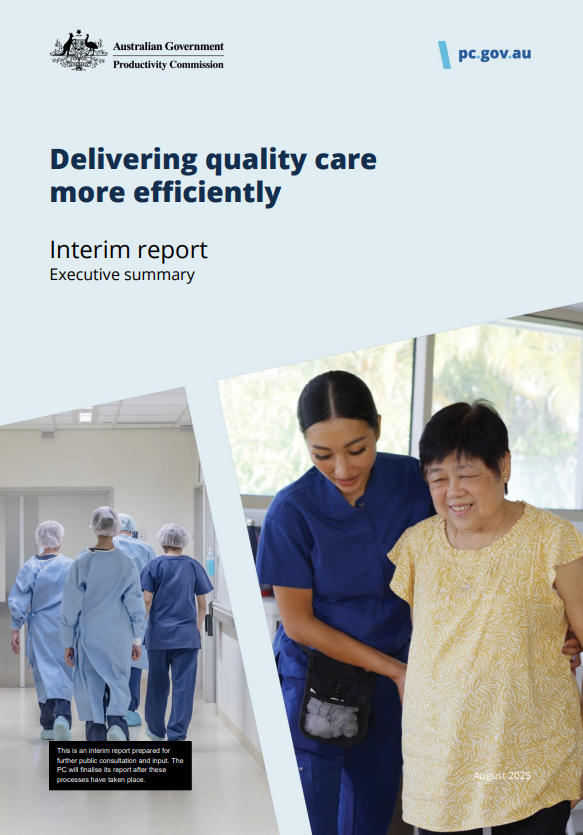Delivering quality care more efficiently

Interim report
Released 13 / 08 / 2025
The PC has been asked by the Australian Government to conduct an inquiry into Delivering quality care more efficiently. As part of this work, we have been tasked with identifying priority reforms and developing actionable recommendations.
In this interim report, the PC presents draft recommendations focused on three key policy reform areas:
- Reform of quality and safety regulation to support a more cohesive care economy
- Embed collaborative commissioning to increase the integration of care services
- A national framework to support government investment in prevention.
We invite feedback and further information from individuals, businesses and organisations. Your insights will help us strengthen our recommendations and identify practical pathways for implementation.
Webinar
Podcast
A transcript will be available shortly.
Improving efficiency to deliver better care
The Australian Government should better align quality and safety regulation across the care economy, including through a national approach to screening care workers, the interim report of a Productivity Commission inquiry recommends. The interim report also recommends facilitating collaboration in the commissioning of care services and establishing a National Prevention Investment Framework to help stop health and other problems before they start or get worse.
The report, Delivering quality care more efficiently, is the final of five that the PC has published over two weeks setting out practical reforms to boost Australia’s productivity.
‘In recent decades Australians have enjoyed more choice in services and better-quality care, but the system is coming under increasing pressure to deliver high quality services at a sustainable cost,’ said Commissioner Angela Jackson.
‘Our proposed reforms seek to break through government’s siloed approach to decision-making and lift national productivity by improving the quality and efficiency of care services.’
Increasing cohesion in quality and safety regulation across care services
The interim report calls on government to better align quality and safety regulation across the care economy. This will more effectively protect care users from unsafe providers and workers. It will also allow workers to move more easily across care sectors and reduce paperwork for providers so they can redirect that attention to service delivery.
‘Fragmented regulation across the care sector reduces productivity, heightens the risk of harms, limits access to care and creates unnecessary burdens for care providers. Previous reform efforts have faced roadblocks and lost momentum – we need a fresh, concerted approach,’ said Commissioner Martin Stokie.
Among other recommended reforms, the report proposes that over the next three years:
- Australian governments work together to develop a national screening clearance for workers in aged care, the NDIS, veterans’ care and early childhood education and care.
- The Australian Government establishes a common process to assess the suitability of providers, creates a single digital portal to manage registration for providers in aged care, the NDIS and veterans’ care, and ensures a consistent regulatory approach to artificial intelligence in care sectors.
Providing more integrated and tailored care through collaboration
The interim report calls on Australian governments to jointly ensure that local hospital networks, primary health networks and Aboriginal Community Controlled Health Organisations work together to plan, procure and evaluate services for their communities.
Such practices — known as collaborative commissioning — can improve the quality and experience of care, strengthen place-based approaches that promote local autonomy, and reduce potentially preventable hospitalisations and other gaps in service provision. ‘We have seen instances of successful collaborative commissioning initiatives around the country. It’s time to start embedding it through governance and funding reforms so it becomes usual practice,’ said Commissioner Alison Roberts.
The report finds that even a modest 10% reduction in potentially preventable hospitalisations through greater collaboration could save $600 million a year.
Creating a national framework to support investment in prevention
The interim report recommends that the Australian Government establish a National Prevention Investment Framework. This would enable governments to invest in and evaluate programs that bring the greatest long-term benefits to individuals and communities, especially vulnerable populations. Prevention activities, like programs that encourage healthy lifestyles or provide housing to those at risk of homelessness, often produce benefits across a range of sectors.
Governments have long recognised that effective prevention programs can improve population health, lower the cost of services and help individuals live longer, healthier and more productive lives. But the report finds that the way governments invest in prevention is fragmented, constrained by siloes and focuses on the short-term, rather than longer-term benefits of prevention. Australia ranked 27th out of the 36 OECD countries that reported their proportion of health spending on prevention in 2019.
‘Our reform proposal is about encouraging governments to invest now to save later. It will help ensure governments work together to support the most effective prevention programs,’ said Commissioner Alison Roberts.
The PC is now accepting submissions to inform the final report of Delivering quality care more efficiently, which will be delivered to the Australian Government later in the year.
Media requests
The following excel file contains tables of data used to make the figures within this report.
Chart data (Excel - 49.2 KB)Preliminaries: Cover, Copyright and publication detail, Opportunity for comment, Terms of reference, Disclosure of interests, Acknowledgements and Contents
Executive summary
Draft recommendations
About the inquiry
Reform of quality and safety regulation to support a more cohesive care economy
Draft recommendation
A more cohesive regulatory framework would improve care and its efficiency
Towards greater regulatory alignment
Effective implementation requires persistence
Embed collaborative commissioning to increase the integration of care services
Draft recommendation
Collaborative commissioning can improve outcomes
Reform of governance and funding to embed collaborative commissioning
Implementation should commence immediately
A national framework to support government investment in prevention
Draft recommendation
Investing in prevention can improve outcomes and care sector efficiency
A national framework to support government investment in prevention
Implementing a prevention framework across government
A. Public consultation
Abbreviations
References
Consultation closed on 15 September 2025.


